대한민국 KT통신 역사를 모아 준비했습니다.
지금부터 360 컨텐츠를 통해 가상으로 체험해보세요. We have gathered and prepared the history of KT in Korea.
Experience it virtually with 360 content.
인터넷 환경에 따라 화질을 선택해주세요. Please slect quality based on internet speed.
이 사이트는 Chrome에 최적화 되어있습니다.
원활한 체험을 위해 Chrome에서의 접속을 권장합니다. This site has been optimized for the Chrome browser
and recommend connecting through Chrome for the best experience.
많은 데이터 사용량 방지를 위해
WiFi사용을 권장합니다. Wifi use recommended to
avoid heavy data usage.
EXPERIENCE GUIDE
360도로 컨텐츠를 체험하세요 The 360 viewing experience
멀리 떨어진 이들의 마음을 잇기 위해
대한민국 통신은 열심히 성장했습니다. To connect the hearts of people far away,
Korean communication has diligently matured.
처음 수화기를 들던 그 떨림을
삐삐를 쥐고 공중전화로 뛰어가던 설렘을 The thrill of first holding a telephone receiver
The excitement of running to a pay phone after receiving a page
까만 밤 환하게 밝히던 채팅 창을
우리는 지나왔고 추억합니다. The brightly lit chat window on a black night
We remember the nostalgia of the past while moving forward.
지금의 자랑스러운 통신 강국이 되기까지
늘 함께 해온 KT. To become a proud telecommunications powerhouse today
Always together with KT.
앞으로도 우리 모두의 마음이 더욱 가깝고 빠르게 연결될 수 있도록.
마음을 잇는 통신입니다. So that all of our hearts can be connected closer and faster in the future,
It's a heart-to-heart communication.
안녕하세요! 저는 여기 광화문에 위치하고 있는 대한민국 통신 역사 갤러리에 있습니다. Hello! I am here at the Korea Communications History Gallery located in Gwanghwamun.
여러분 혹시 지금 당장 핸드폰이 없다면 어떨까요?
요즘은 친구와 메신저를 주고 받거나 통화하는 일이 너무 당연한 일이 되었지만, "What if you didn't have a cell phone right now?"
These days, it's only natural to talk or exchange messages on the phone with friends.
불과, 약 130년 전에는 내 목소리를 멀리 떨어져 있는 누군가에게 전하는 일이 정말 신기하고
귀한 일이었다고 합니다. Only, about 130 years ago,
it was really amazing and precious to deliver my voice to someone far away.
대한민국의 통신 인프라를 직접 구축하고 운영해온 회사 KT. KT is a company that has built and operated telecommunication infrastructure in South Korea.
우리나라의 통신 시작과 함께 130여년에 걸쳐 오늘 날 까지도 사람들을 가깝게 연결 해주기
위해 열심히 노력 중입니다! With the start of telecommunication in our country,
we are working hard to closely connect people for over 130 years!
그럼 KT와 함께 우리나라 통신의 역사를 알아볼까요?
함께 가시죠! Then shall we explore the history of telecommunication in our country with KT?
Let's go together!
조선시대에는 위급한 메시지나 마음을 전할 때 연기나 횃불을 올리거나
편지를 보내야만 했습니다. During the Joseon Dynasty, people had to raise smoke, fire,
or send letters when delivering urgent messages.
조선시대 말 이런 전통 통신 방법에서 벗어난 근대 통신의 필요성을 느끼게 되었고,
그렇게 시작된 것이 ‘전신 사업’이에요. At the end of the Joseon Dynasty, there was a clear realization for the need to break away from
traditional communication methods and the necessity for modern communications with the start of the telegram business.
1885년 서울과 인천을 잇는 우리나라 최초의 전신선이 개통되었고,
이를 관리하는 관청인 한성전보총국도 문을 열게 됩니다. In 1885, the nation's first telegraph line linking Seoul to Incheon was opened with
the establishment of the Hansung Telegram Office as the operator.
한성전보총국의 개관은 구시대적인 통신 방법을 탈피하고
우리나라 전기통신의 시작을 의미한다는 점에서 아주 중요한 사건이었어요. The opening of the Hansung Telegraph Office was siginifcant for marking the beginning of
modern communications in Korea, breaking away from the antiquated communication methods.
제 옆에 있는 것이 바로 전신기 중 한 종류인 음향 전신기인데요.
여러분도 함께 체험해 보실까요? The type of telegraph next to me is an acoustic telegraph.
Shall we try it together?
우리나라 첫 전화기는 가장 특별한 사람들만 사용했을 텐데요.
그게 누구였을까요? 1896년의 고종입니다. The first telephone in our country could be used only by the most special people.
Who was it? King Gojong in 1896.
최초의 전화가 궁에 설치되면서
고종은 전화기를 사용하기 시작했어요. King Gojong began to use the telephone
when the first telephone in Korea was installed at the palace.
중요한 일이 있을 때 신하와 직접 통화를 했는데,
전화를 걸기 전에 내시는 신하에게 미리 시간을 알려주었습니다. When there was an important matter he would directly call the servant,
but before the call was made the servant would be told the time in advance
그러면 신하는 시간에 맞춰 의관을 정제하고 네 번의 큰절을 올린 다음
두 손 공손히 전화기를 받들고 통화를 했어요. Then, the servant would come at the appointed time wearing their best outfit and bow four times
before politely holding the telephone with both hands when talking.
예를 중시하던 시대인 만큼 그 모습이 상상이 되죠? Can you picture what that would look like in that era?
고종은 또 직접 인천 감리한테 전화를 걸어 백범 김구 선생의 사형 집행을
중지하라는 명령을 내리기도 했습니다. King Gojong also called the Incheon inspector himself and
ordered the suspension of the execution of Baekbeom Kim Koo.
서울과 인천 사이에 전화가 가설된 것이 사형 집행 불과 사흘 전이었으니
전화 개통이 늦어졌다면 김구 선생의 목숨을 구할 수 없었겠죠? the telephone line was installed between Seoul and Incheon only three days before the scheduled execution,
so if the telephone had been delayed, Kim Gu's life might not have been saved.
여기 보이는 이것이 당시 사용했던 자석식 원리의 전화기입니다.
여러분도 이 전화기를 통해 마음이 담긴 메시지를 보내보세요. This is a magnetic telephone that we used at the time.
Try sending a heartfelt message through this telephone.
이렇게 궁에 전화기가 설치되면서
함께 설치되었던 것이 바로 교환기입니다. When the telephone was installed in the palace,
the switchboard was installed together.
당시 교환기는 사람이 직접 회선을 손으로 접속하는 수동식 교환기였고
지금의 덕수궁에 설치되었습니다. The swithchboard at the time was a manual switchboard that required an operator to
directly connect calls by hand, it was installed in the current Deoksugung Palace.
조선의 마지막 황태자인 의친왕과 궁내 교환원 사이의 러브스토리가 기록되어 내려오는데요. The love story between King Uichin, the last crown prince of Joseon,
and the palace switchboard operator was recorded.
전화를 자주 이용하다 보니 자연스레 교환원과의
연결이 많아지고 정이 들어 후실로까지 들어오게 된 이야기예요. As the telephone was more frequently used,
it naturally increased the connection with the operator and became attached to the back room.
이렇게 당시의 전화 방식으로 인해 이용자와 교환원이라는
새로운 형태의 로맨스가 등장하기도 했답니다. In this way, a new form of romance between
the caller and the operator was introduced.
처음에는 전화 관련 기술 등을 습득한 관직에 있는 특정 계층들의 직업이었지만, At first, it was the job of certain classes in government positions who acquired telephone-related skills,
전화 이용 수가 증가하면서 좀 더 넓은 새로운 직업 군으로 탄생하게 됩니다. As the number of telephone users increases, it created a larger new line of work.
이후 자동 교환기가 나오고 114안내원의 역할로 바뀌면서 전화번호를 안내해 주게 되어요. After the introduction of the automatic switchboard, the operator role changed to the 114 receptionist,
providing direct phone numbers.
그럼 여러분도 교환원이 되어
사람들의 마음을 직접 연결해볼까요? Let's become operators and connect people's hearts.
소수의 사람만 사용 가능했던 전화기가 좀 더 대중들에게 열리는 계기는
바로 공중용 전화가 개설되면서부터입니다. The telephone that was only available to a few people increasingly opened up to the public more and more
with the launch of the public telephone.
한성과 인천 사이 통신이 가능한
공중용 전화기가 처음 개설되게 되는데요! The first public telephone that can communicate between
Hanseong and Incheon opened!
그 당시 이용 요금은 50전으로,
쌀 다섯 가마니, 약 400kg 정도를 살 수 있었다고 합니다. At that time, the cost was 50 jeon (the Korean currency at the time),
the cost of five bags of rice, weighing about 400 kilograms.
이후 평양, 수원, 마포 등 총 9개의 전화 소를 설치하게 됩니다. Afterwards, a total of nine telephone stations were installed,
including Pyongyang, Suwon, and Mapo.
워낙에 비싼 비용이다 보니
이때의 전화 이용률은 높지 않은 편이었어요. Since it was so expensive,
the telephone usage rate was not high at this time.
그러던 중 급기야 1905년
일본의 통신 권 장악이 시작되게 됩니다. Then in 1905, Japan seized control over telecommunications.
당시 ‘한일 통신협정’을 강제로 체결하게 되고
통신 권을 강탈했는데요. At that time, the forced signing of
the Korea-Japan Communication Agreement usurped communication authority.
이로 인해 공중용 전화기의 확장은 제한되어 관청이나 신문사, 극장 등에만 설치되었어요. As a result, the expansion of public telephones was limited and only installed in
government offices, newspapers, and theaters.
광복 이전의 통신 현황을 살펴볼 수 있는 사료로는 경성 전화번호부가 있는데요. The Gyeongseong telephone directory provided a glimpse of the status of communication
before Korea's liberation from Japanese colonial rule.
이것은 국내 유일한 전화번호부로,
원주 사료 관에서 좀 더 자세히 살펴볼게요! This is the only telephone directory in Korea, so let's take a closer look at the Wonju Archives!
광복 후에도 6.25전쟁으로 시설들이
큰 피해를 입어 폐허가 된 통신망을 열심히 복구했고 After Korea's liberation from Japanese colonial rule, the facilities were severely damaged by the Korean War,
and the ruined communication network that was diligently restored.
1960년대에 들어서면서 전쟁 이전 수준으로 돌아가게 됩니다. By the 1960s, it returned to pre-war levels.
점차 회복되면서 1962년에는 관리인이 없는 무인 공중전화기가
지금 종각의 맞은편이었던 화신 백화점에 처음 설치되게 됩니다. With the gradual recovery, in 1962 an unmanned public telephone without a manager was first installed at the Hwashin Department Store,
located directly across from it current location in Jonggak.
그런데 이 무인 전화기가 고장이 잦아서 동전을 먹어버리곤 해 사람들의 신고도 많았어요. However, there were many reports from people as this unmanned telephone was frequently broken, eating up coins.
그 이유 중에 하나가 동전이 아니라 쇠붙이 같은 걸 넣고 전화를 걸려는 사람들이 많았기
때문이었답니다. One of the reasons was that there were many people who tried to make telephone calls with metal, not coins.
이후 공중전화 다섯 대를 설치한 차량이
시내 번화가를 돌면서 시민들에게 전화를 걸 수 있도록 After that, a vehicle with five public telephones installed could make calls to
citizens while going around the downtown area.
편의를 제공한
‘이동공중전화차’도 잠시 등장했습니다. The convenient “mobile public telephone car” briefly appeared.
한 번쯤 들어봤을 만한, 이장희의 ‘그건 너’라는
노래는 짝사랑하는 사람에게 전화를 걸기 위해 You probably have heard at least once,
Lee Jang-hee’s song “That's You” about a man standing in front of a public telephone to call an unrequited love
공중전화 앞에 서 있는 남자의 모습을 그린 건데요.
그만큼 당시 공중전화는 아주 많은 사람들의 마음을 전하는데 큰 역할을 하게 됩니다. At that time, public telephones played a big role in conveying the hearts of so many people.
1970년대의 전화기 값은 50평 대 집값을 웃돌았기 때문에
모든 가정에 전화기를 들이기는 어려웠고, In the 1970s, it was difficult to put a telephone in every home
because the price of a telephone exceeded the price of a 165 sq. meter (50 pyeong) house.
대부분의 사람들은 계속해서 공중전화와 하나의 전화선으로 여러 가입자가 사용하는
공동 전화를 애용하게 됩니다. Most people continue to prefer public telephones and and joint telephones used by
multiple subscribers on a single telephone line.
이후 1982년에 최초의 국산 공중 전화기
일명 DDD 공중전화기를 개발하는데 성공하게 됩니다. Then in 1982, we succeeded in developing the first domestic public telephone, so-called DDD public telephone.
자 그럼 이제, 우리나라를 넘어 해외와의 통신이
어떻게 이루어지기 시작했는지 함께 살펴보겠습니다. Now, let's take a look at how communications began to take place beyond Korea.
여러분, 바닷속 깊은 곳에도 통신의 역사가 숨겨져 있는 사실 알고 계셨나요?
1980년 부산과 일본 사이 바다에 해저 케이블이 개통됩니다. Everyone, did you know that the history of communication is hidden deep in the ocean?
In 1980, a submarine cable was laid in the sea between Busan and Japan.
이를 시작으로 국제 통신이 발전되는 데 큰 기여를 하게 되었죠. This contributed greatly to the development of international communication.
케이블 개통으로, 국내 전화 가입자는 교환원을 거치지 않고
다이얼만 눌러도 일본과 통화가 가능해졌고, With the opening of the cable, domestic telephone subscribers do not have to go through the switchboard operator.
Instead, just by pressing the dial, we could talk to Japan
보통 10분에서 15분 정도 기다리던 소통 난도 해소되었는데요.
전화뿐만 아니라 텔레비전 전송 사진도 훨씬 쉽게 오갈 수 있게 됩니다. The usual 10 to 15 minutes of waiting had been resolved.
Not only telephone calls but also television transmission can be accessed much more easily.
요즘은 해외에 있는 사람들과의
화상회의나 영상통화도 자유로운데요, Nowadays, we can freely video call or video conference with people overseas.
그 시작이 이렇게 바닷속 깊은 곳에서 시작되었다고 하니 재미있는 것 같죠? Doesn't it sound fun to hear that the beginning started deep in the sea?
무선호출기인 삐삐가 처음 나온 80년대는 전문 직종의 사람들이 주로 사용하고
이후 90년대 대중에게 상용화되었는데요. In the 1980s, when the pager was first introduced,
it was mostly used by professional workers and then commercialized to the wider public in the 1990s.
삐삐에 뜬 전화번호 메시지를 확인하려고
공중전화박스 앞은 항상 길게 줄을 섰다고 합니다. 그때의 애타는 마음이 느껴지는 것 같죠. There is always a long line in front of a public telephone booth to check
the phone number message on the pager. I think I can feel the anxious heart of that time.
지금은 추억의 물건이 된 삐삐의 숫자 메시지를
한 번 맞춰볼까요? Shall we guess the numeric message of the pager,
which is now a thing of memory?
삐삐의 등장으로 시내전화 수급이 빠르게 증가하는데요. With the appearance of the pager, the supply and demand of local calls increased rapidly.
낮은 통화 품질을 해결하기 위해 전자교환기를 도입하고자 기술 개발팀을 꾸리게 되었고
1982년 TDX라는 한국형 전전자 교환기가 도입됩니다! To address low call quality, a technology development team was set up to introduce an electronic switchboard,
and in 1982 a Korean electronic switchboard called TDX was introduced!
덕분에 기존에는 1년씩이나 걸리던 전화 보급 적체 현상이 일시에
해결되었습니다. Thanks to this, the telephone supply backlog,
which used to take a year, was resolved at once.
이 전전자교환기를 통해 대한민국 통신 성장의 새로운 시대가 열린 거죠. Through this electronic switchboard,
a new era of communication growth in Korea was opened.
“여보세요~ 저 슬기 친구 해림인데요. 혹시 슬기 집에 있어요?”
여러분 혹시 친구에게 전화를 걸며 이런 말을 해보신 적이 있나요? "Hello~ This is Seulgi's friend, Haerim. Is Seulgi home by any chance?"
Have you ever made a call and say something like this?
지금처럼 모두가 휴대폰을 가지고 있지 않을 때는 집 전화의 이용이 흔한 일이었습니다. When everyone didn't have a cell phone, it was common to use a home telephone.
앞서 말씀드린 TDX 개발이 성공하면서 1987년에는 전화 가입자가 1000만을 돌파하게 되는데요, With the success of the development of TDX, the number of telephone subscribers surpassed 10 million in 1987.
이제는 친구와 가족과 전화로 수다를
떨 수 있게 되고 소소한 일상까지도 공유할 수 있게 된 것입니다. Now I can chat on the telephone with my friends and family and share my daily life.
그야말로 1가구 1전화 시대가 열리고 ‘용건만 간단히’라는 슬로건을 강조하던
시절은 역사 속으로 사라지게 되었죠. Indeed, the era of one-household telephony opened and the days of emphasizing the slogan "Just simple use" disappeared into history.
당시 집 전화기 사용이 활발해지면서 다양한 디자인들이 쏟아져 나오기 시작했는데요.
이곳 갤러리에도 이렇게 다양한 전화기가 있는데, At the time, the use of home telephones became more active, and a variety of designs began to pour out.
There are so many different telephones in this gallery,
좀 더 많은 전화기를 둘러보실 분은
버튼을 눌러보세요! If you want to look at more telephones, press the button!
우리나라 최초의 인터넷은 어떤 모습이었을까요?
그 시작은 SDN이라는 전산망의 한 종류를 연결하면서부터입니다. What was the first Internet like in our country?
It started when we connected a computer network called SDN.
최초의 인터넷은 일반 전화선을 모뎀에 연결해서 사용하는 방식이었기 때문에
연결할 때 특유의 전화 연결음을 들을 수 있었죠. The first Internet was a way to connect a regular telephone line to a modem, so when you connect,
you can hear a distinctive dial tone.
이때 천리안, 하이텔, 나우누리 등 양방향 소통이 가능했던 PC 통신이
사용되게 됩니다. At this time, PC communication, which enabled two-way communication,
such as Chollian, HiTEL, and Naunuri, was used.
이후 1994년 KT가 코넷이라는 이름으로 인터넷 서비스를 시작합니다. After that, in 1994, KT started Internet service under the name of Kornet.
코넷은 우리나라 최초로 인터넷 전용선을 연결한 인터넷 서비스로,
대중화된 동기로 작동했습니다. Kornet is the first Internet service in Korea that connects Internet-only lines,
working towards popularization.
당시 국내 최초로 온라인 머그게임인
‘단군의 땅’이 출시되고 인터넷 카페도 등장했죠. At that time, 'Dangun Land', the first online mug game in Korea,
was released and internet cafes appeared.
계속해서 초고속 인터넷이라 불리는 ADSL, VDSL, 광케이블 등
지금에 이르기까지 발전해왔습니다. ADSL, VDSL and optical cable,
which are called high-speed Internet, have been developed up to now.
여러분도 제 옆에 보이는 이 하이텔 단말기를 통해 채팅 방에
직접 접속해보세요! You can also access the chat room directly
through this HiTEL terminal next to me!
지금은 모두의 필수품이 된 이동전화.
그 시작은 CDMA 방식의 기술을 우리나라가 세계 최초로 상용화에 성공하게 되면서입니다. Now the mobile phone is a necessity for everyone.
The start was when Korea succeeded in commercializing CDMA technology for the first time in the world.
1년 뒤 PCS 상용 서비스가 개시되고 이로 인해 이동통신은 날개를 달며
세상의 그 어떤 물건보다도 빠르게 확산되었죠. A year later, PCS commercial services were launched,
and mobile communication spread faster than any other object in the world.
1999년에는 이동전화 가입자 수가 유선전화 가입자 수를 뛰어넘기에 이릅니다. In 1999, the number of mobile phone subscribers surpassed that of fixed-line telephone subscribers.
이제는 고정된 장소에 가야 전화할 수 있던 시대가 아니라 내가 있는 곳이 곧 전화를
걸 수 있는 1인 1전화 시대가 온 것입니다. Now, it is no longer the era when you can call from fixed place,
but the era of one person and one phone calling where ever you may be.
이때 한국통신의 자회사였던 한국이동통신이
이동통신 서비스를 시작했고, At this time, Korea Mobile Communication, a subsidiary of Korea Telecom,
started mobile communication service.
이후 PCS에서 우리가 알고 있는 2G부터 최근의 5G까지 이를 수 있었습니다.
좀 더 다양한 당시 이동통신들을 구경해보세요! Since then, PCS has been able to reach from 2G, as we knew it, to 5G today.
Look at the more diverse mobile communications at the time!
2000년대는 초고속 인터넷의 시대라고 부를 수 있습니다. The 2000s can be called the age of high-speed Internet.
2002년에는 가입자가 무려 1000만명을 돌파하면서 세계 최고의 보급률과 속도를 자랑했습니다. In 2002, the number of subscribers surpassed 10 million,
boasting the world's highest penetration rate and speed.
2004년엔 집 밖에서 사용할 수 있는 휴대인터넷 Wibro를 개발하면서
우리나라는 기술 사용료를 받는 나라로 성장하게 됩니다. In 2004, we developed WiBro, a portable internet that can be used outside of our home,
and Korea grew into a country that receives technology fees.
Wibro 이후 3G를 거쳐 4G LTE와 5G까지 오면서
IPTV가 본격화되고, 스마트폰이 대중화되는 성과를 이루었어요. After Wibro, came to 4G LTE and 5G,
and IPTV began in earnest with smartphones becoming popular.
KT는 2018년 평창동계올림픽에서 성공적으로 5G 시범 서비스를 선보였고,
2019년엔 세계 최초로 상용화에 성공합니다. KT successfully introduced a 5G pilot service at
the 2018 PyeongChang Winter Olympics and the world's first successful commercialization in 2019.
이는 최근 4차 산업혁명의 토대가 되고 있죠. This is the foundation of the recent Fourth Industrial Revolution.
지금까지 여기 광화문에서 여러분과 함께 대한민국
통신 역사 갤러리를 둘러보았습니다. So far, we have toured the Korea Communication History Gallery with you in Gwanghwamun.
우리 통신의 역사와 함께 해온 KT. 외부에 공개되지 않는,
통신의 보물창고 같은 공간이 원주에 있다는 사실을 알고 계셨나요? KT has been with the history of telecommunications in Korea.
Did you know that there is a treasure trove of communications history in Wonju that is not open to the public?
가치 높은 사료들을 따로 보관한 소중한 공간인데요.
지금부터 저와 원주로 이동하겠습니다! 함께 가시죠! It's a precious place to store high-value items.
From now on we will move to Wonju! Let's go together!
이곳은 원주에 위치한
‘원주 KT 통신 사료관’입니다! This is 'Wonju KT Communication Archives' located in Wonju!
지금껏 외부에 공개되지 않았던 사료들이
가득한 이곳을 좀 더 자세히 살펴볼까요? Why don't we take a closer look at this place full of
historical materials that has never been open to the public?
와~ 어떠세요? 지금 함께 보시는 이 공간은 광화문에서도 살펴보았던 전신 시설과
교환 시설의 더 많은 종류를 볼 수 있는데요. Wow~ How is it? In this space you see now, you can see more types of
telegraph and switchboard facilities that were also examined in Gwanghwamun.
특히 여기 이곳을 보시면 1960년대와
70년대 사용한 인쇄 전신기가 있습니다. If you look here, you can see the printing telegraph used in the 1960s and '70s.
주로 전신국, 우체국에 설치되어 정보를
주고받는 용으로 사용되었어요. It was mainly installed in telegraph and post offices to exchange information.
제 앞에 있는 전신기는 영문이 아닌 한글 풀어쓰기 방식의 한 영문 겸용으로
쓰였다고 하니 더 편리했겠죠? The telegraph in front of me would have been more convenient as it was used for both
Korean and English by applying the Korean translation method from the existing telegraph exclusively for English, right?"
타닥타닥 소리를 내며 타자기를 치면
종이에 메시지를 인쇄할 수 있어서, You can print a message on paper by typing a typewriter with a click clack sound,
서면 통신의 속도를 아주 향상시킬 수 있던 계기가 되었다고 볼 수 있습니다. which can be seen as an opportunity to greatly improve the speed of written communication.
이곳은 원주에 위치한
‘원주 KT 통신 사료관’입니다! This is 'Wonju KT Communication Archives' located in Wonju!
지금껏 외부에 공개되지 않았던 사료들이
가득한 이곳을 좀 더 자세히 살펴볼까요? Why don't we take a closer look at this place full of
historical materials that has never been open to the public?
와~ 어떠세요? 지금 함께 보시는 이 공간은 광화문에서도 살펴보았던 전신 시설과
교환 시설의 더 많은 종류를 볼 수 있는데요. Wow~ How is it? In this space you see now, you can see more types of
telegraph and switchboard facilities that were also examined in Gwanghwamun.
특히 여기 이곳을 보시면 1960년대와
70년대 사용한 인쇄 전신기가 있습니다. If you look here, you can see the printing telegraph used in the 1960s and '70s.
주로 전신국, 우체국에 설치되어 정보를
주고받는 용으로 사용되었어요. It was mainly installed in telegraph and post offices to exchange information.
제 앞에 있는 전신기는 영문이 아닌 한글 풀어쓰기 방식의 한 영문 겸용으로
쓰였다고 하니 더 편리했겠죠? The telegraph in front of me would have been more convenient as it was used for both
Korean and English by applying the Korean translation method from the existing telegraph exclusively for English, right?"
타닥타닥 소리를 내며 타자기를 치면
종이에 메시지를 인쇄할 수 있어서, You can print a message on paper by typing a typewriter with a click clack sound,
서면 통신의 속도를 아주 향상시킬 수 있던 계기가 되었다고 볼 수 있습니다. which can be seen as an opportunity to greatly improve the speed of written communication.
여러분 중에 혹시 두꺼운 전화번호부 생각나는 분 계시나요?
생각나시는 분들은 아마 옛날 사람일 텐데요! Can anyone picture a thick telephone book?
Those of you who can think of it are probably old people!
통신이 발달하고 전화 가입자 수가 많아짐과 동시에 1966년부터는 전화번호부를 발행하기
시작했습니다. With the development of communication and the increase in the number of telephone subscribers,
we started to publish telephone books in 1966.
당시 유선 가입자들이 쉽게 번호를 찾을 수 있도록 한국통신에서는 1년에 1부씩
무료 배포를 했답니다. At that time, Korea Telecom distributed one free copy a year so that
wired subscribers could easily find the number.
바로 여기 보이시는 것처럼 두꺼운 전화번호부들이 집이나 공중전화 앞에 놓여있었습니다. As you can see right here, there were thick telephone books
in front of the house or the pay phone.
이후에 인터넷이 확대되면서 CD 형태의 전화번호부를 발매하기도 했지만
큰 인기를 끌지는 못했어요. Later, as the Internet expanded,
a CD-type telephone book was released, but it was not very popular.
또 한 가지 전화번호부에 숨겨진 비밀은 90년대 이전에 발행된 전화번호부
맨 뒷부분에는 ‘전시 국민 행동 요청’이 나와있다고 합니다. Another secret behind the telephone book is that the last part of
the telephone book published before the 90s shows the "Wartime National Code of Conduct."
여기 있는 이 전화번호부는 앞서 말씀드렸던 경성 전화번호부입니다.
일제시대 유일하게 남아있는 전화번호부로, This telephone book here is the Gyeongseong telephone directory I mentioned earlier.
It's the only telephone book left from the Japanese Colonial Period.
전화 국사의 위치나 내부 도면 등이 기재되어 있는데요!
이 전화번호부에 얽힌 재미있는 스토리가 궁금하신 분은 클릭해보세요! It contains the location of the telephone company and internal drawings!
If you're curious about the funny story behind this phone book, click on it!
여기서 잠깐 퀴즈! 여러분 자동식 전화기와 전자식 전화기의 차이가 뭔지 아시나요?
언뜻 보면 비슷한 말 같기도 한데요. Stop for a quiz! Do you know the difference between an automatic telephone set and an electronic telephone set?
At first glance, it sounds like a similar.
자동식 전화기는 다이얼을 돌리는 방식의 전화기이고,
전자식 전화기는 버튼을 누르는 전화기라고 보시면 됩니다. The automatic telephone set is a dial-rotating phone,
and the electronic telephone is a button-pressing phone.
여기 보이는 것처럼 동그란 판에 적인 숫자들을 보고,
다이얼을 돌려가며 전화번호를 입력하는 것이 다이얼 전화기예요. As you can see here,
it's a dial telephone where the numbers are in a circle and the dial rotates to enter the phone number.
0이나 9는 끝에 위치했기 때문에 이렇게,
한 번 돌리면 제자리로 돌아오는데 시간이 많이 걸렸겠죠. Because 0 or 9 was at the end,
it would have taken a long time to get back to where it was.
그래서 전화번호에 0과 9가 들어가면 전화 걸기 더 오래 걸렸다는 것도 재미있습니다. So it's interesting that if you put 0 and 9 in the phone number, it took longer to make a call.
지금의 핸드폰은 터치가 대부분이고, 가끔 사용하는 전화기들도 버튼식이라
다이얼 전화기를 많이 보지 못하지만, Most of the cell phones are touch-sensitive,
and I don't see a lot of dial phones because they are button-type.
돌렸을 때 나는 차르르 하는 소리를 들으며 전화를 거는 것도 아주 색다른 느낌이 들 거예요.
자리를 옆으로 옮겨 공중전화 카드에 대해 알아볼까요? When I turn it around, it'll feel very different to make a phone call listening to the sound of my voice.
Shall we move on and find out about the pay phone card?
처음 나온 공중전화는 동전을 넣어야만 작동이 되었는데요,
거스름돈이 반환되지 않는 것에 대해 사람들의 불만이 높아졌다고 합니다. The first public telephone only worked when coins were inserted,
but people complained that the change was not returned.
이를 해소하기 위해 쓰는 비용만큼 차감되는 공중전화 카드가 등장했습니다. The pay phone card emerged to deduct as much as you spend to solve this problem.
이런 공중전화 카드는 당시 KT전화국이나 일반 상점에서 구입이 가능했는데요! These pay phone cards were available at KT's phone station or general store at the time!
보시는 것처럼 올림픽을 기념한 디자인도 있고 엑스포 기념, 문화재 사진 등으로 꾸며진
여러 카드들이 만들어졌어요. As you can see, there are designs to commemorate the Olympics and
various cards decorated with Expo memorials and cultural heritage photos were made.
공중전화 카드를 사용하러 함께 가볼까요? Shall we go together to use a pay phone card?
제가 도착한 이 공간은,
원주 KT 통신 사료관 중에서도 가장 귀한 사료들만으로 꾸며진 특별한 곳입니다! This space, where we arrived, is a special place decorated with
only the most valuable materials among the Wonju KT Communication Archives!
이곳이라면 공중전화 카드를 사용할 수 있는 공중전화를 찾아볼 수 있을 텐데요, 함께 볼까요. If you're here, you can find a public telephone where you can use a pay phone card. Let's take a look.
와! 여기 알록달록한 전화기들이 많네요, 이것들이 다 이전에 쓰였던 공중전화기들입니다! Wow! There are so many colorful telephones here, these are all old public telephones!
여기 91년도에 만들어진 공중전화기를 보시면 전화기 사용법이 재미있게 쓰여 있어요. If you look at the public telephone made in 1991, it says how to use the phone in a funny way.
수화기를 들고 동전이나 카드를 선택하고 전화번호를 누르면 전화가 걸리는
방식인 걸 알 수 있죠. Pick up the phone, pick up a coin or card, and dial the phone number to find out how the call works.
그리고 이 전화기는 86년 아시안게임을 계기로 등장한 MS 카드 식 공중 전화기입니다.
지금까지 우리가 사용하고 있는 모델이죠! And this is a MS card public telephone that appeared in the wake of the Asian Games in '86.
It's the model we've been using!
이제는 여러분도 길가에서 공중전화기를
만나면 더 반가운 마음이 들 것 같습니다. Now I think you'll be more than happy to meet a public telephone on the side of the road.
아주 예전에, 김국진의 유행어 ‘여보세요?’ 가 등장했던 광고를 알고 계시나요?
전화기를 들고 여보세요?를 반복하는데요. Do you happen to remember an advertisement in which Kim Kuk-Jin's buzz word ""Hello?"" appered a long time ago?
He picks up the telephone and repeats Hello?
바로 시티폰 광고였습니다. 지금까지 살펴봤던 공중전화까지 달려가지 않고도
삐삐 메시지를 확인할 수 있었던 전화가 바로 시티폰이었어요. It was a city telephone commercial. The city telephone was the telephone that
allowed me to check the pager message without running to the public telephone.
수신은 안되고, 오로지 발신만 가능했던 지금 생각해보면 정말 신기한 핸드폰이죠. If you think about it now, it's a really interesting phone.
수신율이 좋지 않아서 공중전화박스 근처로 가서 안테나를 뽑고 전화를 해야 하는
모습을 상상해보니 웃음이 납니다. It makes me laugh when I imagine having to go near a public telephone booth and
unplug the antenna to make a call because of poor reception.
한 마디로 들고 다니는 공중전화와 마찬가지였던 시티폰은 이후 이동전화들이 발달하게 되면서 In a word, the city telephone, which was the same as a public telephone you could carry,
was developed later as mobile phones
지금은 역사 속으로 사라지고 말았지만 통신의 발전 과정에서
하나의 기록으로 여전히 기억되고 있어요. Although it has disappeared into history now,
it is still remembered as an achievement in the development of telecommunications.
이곳에 있는 이 핸드폰들을 한 번 보시겠어요? Would you like to take a look at these mobile phones here?
아날로그폰을 시작으로 지금의 5G 폰에
이르기까지 짧은 시간 정말 눈부신 발전을 해온 걸 한눈에 알 수 있습니다. From analog phones to current 5G phones,
you can see at a glance how much progress has been made in a short period of time.
KT와 함께 한 대한민국 통신의 첫걸음부터 현재의 모습까지
살펴보았는데 어떠셨나요? We looked at the first steps of communication in
Korea with KT from the past to the present. How was it?
오랜 시간 사람들을 연결해 주기 위해 다양한 노력들을 해온 것처럼
더 많은 사람들을 가깝게 이어주기 위한 앞으로의 발전들도 기대됩니다. Just as we've been trying to connect people for a long time,
we're looking forward to future developments to bring more people closer.
여러분에게도 저와 함께 둘러본 광화문과 원주의 사료관을 통하여
통신과 연결의 설렘을 되새기고 소중히 여기는 계기가 되었으면 합니다. I hope that this will be an opportunity for you to reflect on and cherish the excitement of
communication and connection through Gwanghwamun and Wonju's communications history hall.
지금까지
케이티 텔레 뮤지엄이었습니다. This has been KT Telecommunications Museum.
EXPERIENCE 01
한글 모스부호가 있다는 사실, 알고 계셨나요?
전신기를 통해 모스부호를 입력하여
고마운 마음을 전해보세요. Did you know that there is a Korean Morse code?
Express your gratitude through the telegraph.
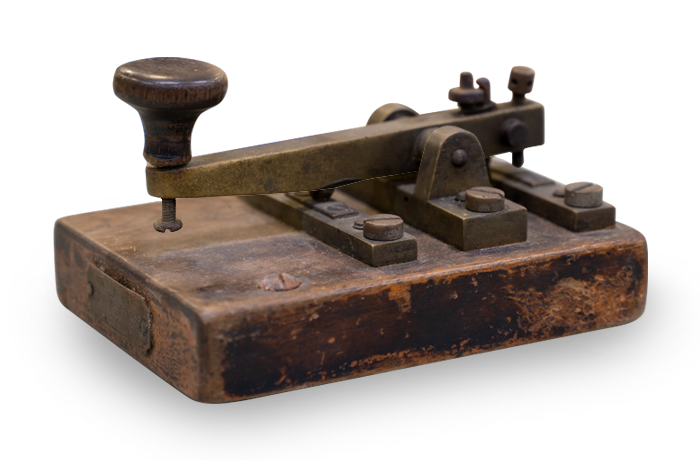
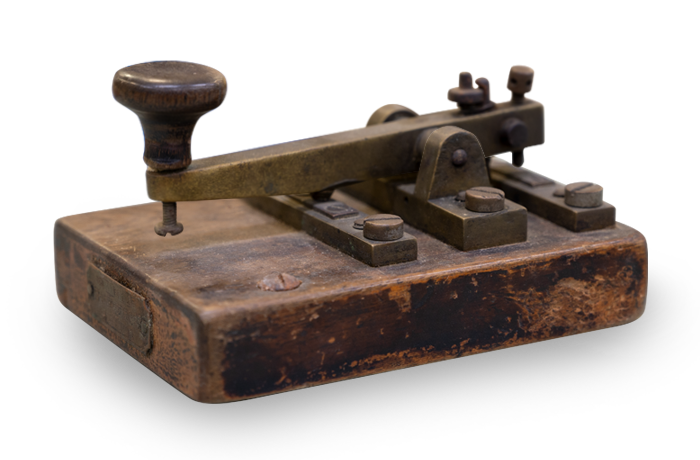
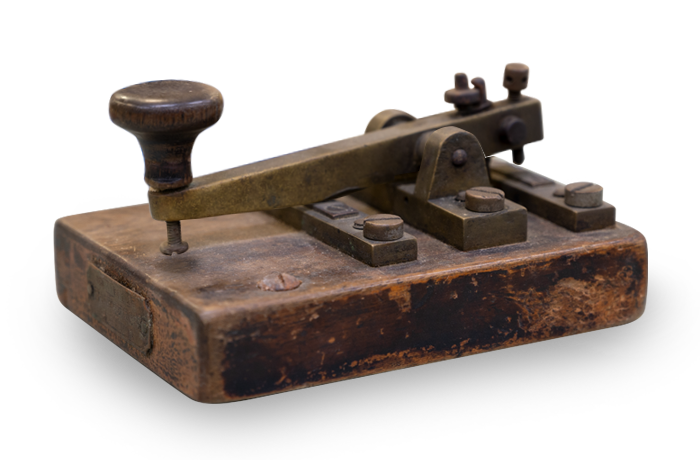
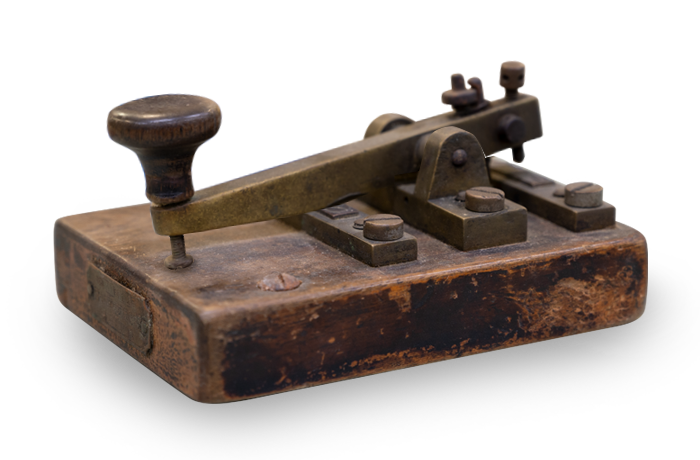
길게 눌러보세요 Press and hold.
짧게 눌러보세요 Press it briefly.
이루어진 복잡한 한문 모스부호를 사용했어야 했는데요, I should have used the Morse code, the four-digit complex Chinese Morse code, which was used for telegraphic communication.
좀 더 쉬운 통신이 가능해졌답니다. With the completion of the Hangul Morse Code in 1884, easier communication became possible.
우리말 “고마워”를 전송해보세요. From now on, click on the telegraph and send the Korean word for "Thank you."
이루어진 복잡한 한문 모스부호를 사용했어야 했는데요, I should have used the Morse code, the four-digit complex Chinese Morse code, which was used for telegraphic communication.
좀 더 쉬운 통신이 가능해졌답니다. With the completion of the Hangul Morse Code in 1884, easier communication became possible.
우리말 “고마워”를 전송해보세요. From now on, click on the telegraph and send the Korean word for "Thank you."
고마운 마음을 전달했습니다. I've conveyed my gratitude.
음향 전신기 Acoustic
telegraph
자석식 전화기 Magnetic
telephone
교환기 Switchboard
삐삐 Pager
하이텔 HiTEL
EXPERIENCE 02
조선시대 고종이 처음으로 사용했던 자석식 전화기.
그 때의 설렘을 담아, 나에게 힘을 줄 수 있는
메시지를 보내보세요! 11월에 문자메시지로 도착합니다. The first magnetic telephone was used by
Emperor Gojong of the Joseon Dynasty,
send a message to yourself in the future so that
you too can feel the excitement of that time!

길게 눌러보세요 Press and hold.
덕수궁에 밀려난 고종, 창덕궁에 기거하던 순종은 In 1907 due to the Hague Secret Emissary Affair, Japan forced Gojong to retire from the Emperor's position and expelled him to Deoksugung Palace.
하루 네 번 문안인사를 올렸답니다. Soonjong, who succeeded King Gojong as emperor, lived in Changdeokgung Palace and made a phone call to Deoksugung Palace four times a day.
나에게 하고싶은 말을 적어 보내 보세요. You should also write down a heart felt message of what you want to say to yourself in the future.
덕수궁에 밀려난 고종, 창덕궁에 기거하던 순종은 In 1907 due to the Hague Secret Emissary Affair, Japan forced Gojong to retire from the Emperor's position and expelled him to Deoksugung Palace.
하루 네 번 문안인사를 올렸답니다. Soonjong, who succeeded King Gojong as emperor, lived in Changdeokgung Palace and made a phone call to Deoksugung Palace four times a day.
나에게 하고싶은 말을 적어 보내 보세요. You should also write down a heart felt message of what you want to say to yourself in the future.
미래에 도착하는 메시지를 기다려보세요. Wait for the message to arrive in the future.
음향 전신기 Acoustic
telegraph
자석식 전화기 Magnetic
telephone
교환기 Switchboard
삐삐 Pager
하이텔 HiTEL
EXPERIENCE 03
그 시절, 통화로 마음을 이어주던
교환원을 체험해보세요. In those days, experience an operator
who connected your heart with a phone call.
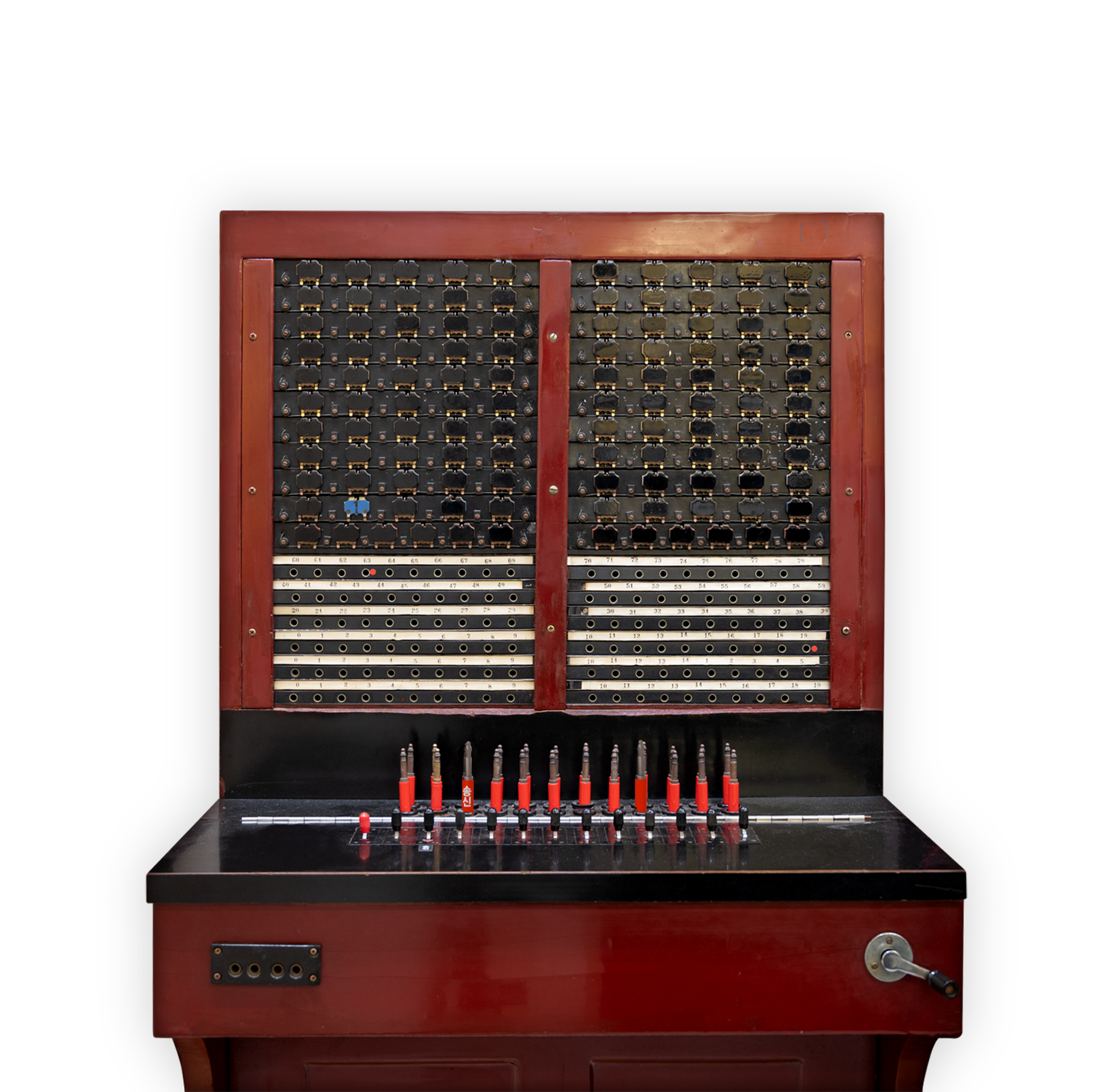
“아야, 거리에 포목점에 전화 하려는디
연결 좀 해주시오.” “Hi. Please connect me
to the fabric shop.”
“포목점이오.
어인일로 전화하셨소.” “ This is the fabric shop.
Why have you called?”
드래그 해주세요 Please drag it
오랜 시간이 걸렸다고 해요. In the past, it took a long time to connect calls.
교환원에게 음료를 사다 주기까지 했답니다. I even bought a drink for the operator to speed up the connection.
업무를 직접 체험해볼까요? Why don't we experience the work of these busy operators?
오랜 시간이 걸렸다고 해요. In the past, it took a long time to connect calls.
교환원에게 음료를 사다 주기까지 했답니다. I even bought a drink for the operator to speed up the connection.
업무를 직접 체험해볼까요? Why don't we experience the work of these busy operators?
전화 연결에 성공했습니다. Telephone connection was successful.
음향 전신기 Acoustic
telegraph
자석식 전화기 Magnetic
telephone
교환기 Switchboard
삐삐 Pager
하이텔 HiTEL
EXPERIENCE 04
과거에는 무선호출기(삐삐)를 통해
마음을 전달했다는 사실을 아시나요?
사랑하는 마음은 어떻게 전했을지 알아보세요. Did you know that in the past,
you communicated your heart
through a pager (beeper)?
Find out how to convey your love.

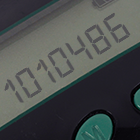
메시지의 1010486은 의미는 무엇일까요?
시간 내에 맞춰보세요! What does 1010486 in the message mean?
Try to get the answer in time!
제한시간을 모두 사용했습니다.
정답은 “열렬히 사랑해” 입니다. I used up my time limit.
The answer is “Love you so much”
정답 입니다! Correct answer!
틀렸습니다.
정답은 “열렬히 사랑해” 입니다. Wrong answer.
The answer is “Love you so much”
마음을 표현했다고 해요. It is said that lovers in the past expressed
their hearts through the numeric codes on a pagers.
“연인사이”는 0242 이런식으로 말이죠. “I love you forever” is 0404,0124,
“between lovers” is 0242 like this.
1010486 은 어떤 의미를 가지고 있을까요? Beep! A pager message arrived from your lover.
What does 1010486 mean?
마음을 표현했다고 해요. It is said that lovers in the past expressed
their hearts through the numeric codes on a pagers.
“연인사이”는 0242 이런식으로 말이죠. “I love you forever” is 0404,0124,
“between lovers” is 0242 like this.
1010486 은 어떤 의미를 가지고 있을까요? Beep! A pager message arrived from your lover.
What does 1010486 mean?
사랑의 마음을 전달했습니다. Sending my love
음향 전신기 Acoustic
telegraph
자석식 전화기 Magnetic
telephone
교환기 Switchboard
삐삐 Pager
하이텔 HiTEL
EXPERIENCE 05
과거에 하이텔에서 사용되었던 채팅언어를 아시나요?
지금의 채팅언어와 얼마나 다른지 알아보세요. Do you know the chat language
that was used by HiTEL in the past?
Find out how different it is
from the current chat language.




아! 엄마! Oh, Mom!
그런데 이게 무슨 소리일까요? Shall we log on to the HiTEL first? But what does that mean?
이런 소리가 났답니다. At that time, it made this sound because a phone modem was used to connect to it.
어떤 채팅 언어가 있는지 알아볼까요? Connection successful.
Shall we go into the chat room and find out what kind of chat language it is?
그런데 이게 무슨 소리일까요? Shall we log on to the HiTEL first? But what does that mean?
이런 소리가 났답니다. At that time, it made this sound because a phone modem was used to connect to it.
어떤 채팅 언어가 있는지 알아볼까요? Connection successful.
Shall we go into the chat room and find out what kind of chat language it is?
전화 연결에 성공했습니다. Chatting in HiTEL language succeeded.
























































































































